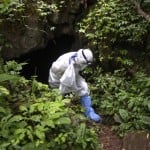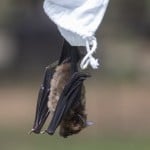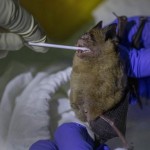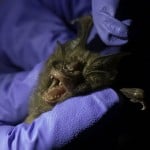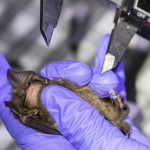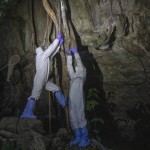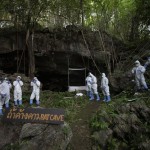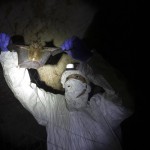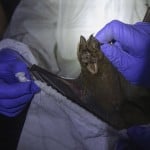Thai Scientist Catch Bats To Trace Coronavirus Origins | PHOTOS
-
1/14
A Researcher With A Bat In A Bag Walk Out From A Cave Inside Sai Yok National Park In Kanchanaburi Province
-
2/14
A Researcher Releases A Bat After Taking Blood Sample Bat Inside Sai Yok National Park In Kanchanaburi Province
-
3/14
A Researcher Swaps Samples From A Bat’s Mouth Inside Sai Yok National Park In Kanchanaburi Province,
-
4/14
Researchers Swap Samples From A Bat’s Mouth Inside Sai Yok National Park In Kanchanaburi Province
-
5/14
A Researcher Catches A Bat To Measure Inside Sai Yok National Park In Kanchanaburi Province
-
-
6/14
A Researcher Measures A Bat Inside Sai Yok National Park In Kanchanaburi Province, West Of Bangkok
-
7/14
Researchers Catch Bat In Front Of Cave Inside Sai Yok National Park In Kanchanaburi Province
-
8/14
Researchers Putting On PPE Suits And Standing In Front Of Cave Prepare Catch Bat Inside Sai Yok National Park In Kanchanaburi Province
-
9/14
Researchers Set Up Equipment For Catch Bat In Front Of Cave Inside Sai Yok National Park
-
10/14
Researchers Carry Equipment For Catch Bat In A Cave Inside Sai Yok National Park In Kanchanaburi Province, West Of Bangkok, Thailand
-
-
11/14
Researchers Set Up Equipment For Catch Bat In Front Of Cave Inside Sai Yok National Park In Kanchanaburi Province, West Of Bangkok, Thailand
-
12/14
Researchers Set Up Equipment For Catch Bat In Front Of Cave Inside Sai Yok National Park In Kanchanaburi Province, West Of Bangkok,
-
13/14
Researcher Removing Bat From A Trapping Net In Cave Inside Sai Yok National Park In Kanchanaburi Province, West Of Bangkok
-
14/14
Researcher Put Bat Into Bag In Cave Inside Sai Yok National Park In Kanchanaburi Province, West Of Bangkok, Thailand
KANCHANABURI, Thailand — Researchers in Thailand have been trekking though the countryside to catch bats in their caves in an effort to trace the murky origins of the coronavirus.
Initial research has already pointed to bats as the source of the virus that has afflicted more than 20.5 million people and caused the deaths of over 748,000 worldwide, according to Johns Hopkins University data. The closest match to the coronavirus has been found in horseshoe bats in Yunnan in southern China.
